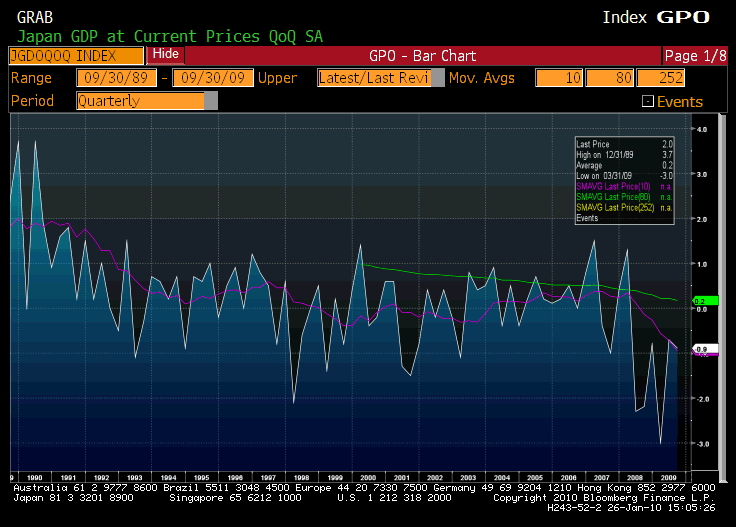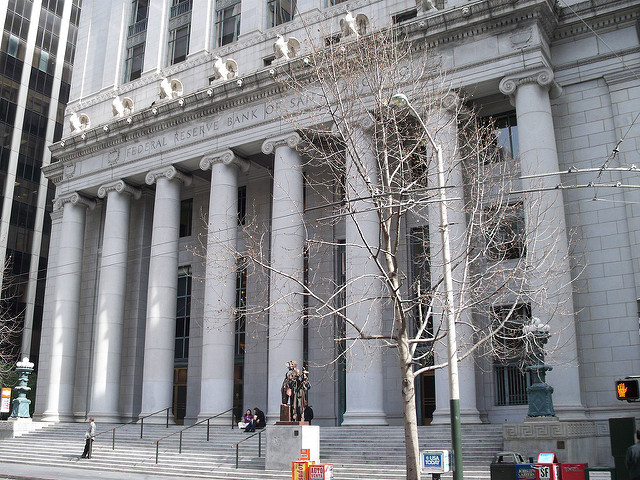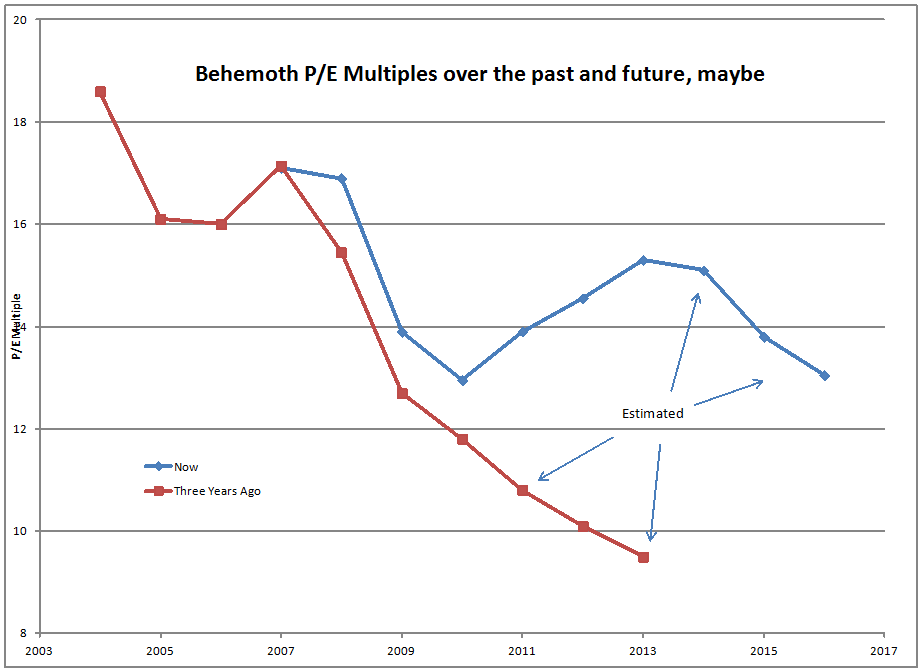More on Sovereign Risk and Semi-Sovereign Risk
When does a sovereign or semi-sovereign government default?? I have seen three answers:
1) When debt is greater than future seniorage revenue (central bank profits) plus future debt repayments.? (Kind of a tautology, but what is implied is that if future debt repayments are onerous, a government would default.)
2) When the interest rate a government pays is greater than the likely growth rate of revenues. (I.e., if you are paying more than your revenue growth rate, the indebtedness will continue to grow without bounds?)
3) When the structural deficit is high, and total interest paid exceeds the size of the structural deficit.? (In that case, default would bring the budget into balance, at the cost of being shut out of the bond market.? But, given the situation, in the short run, being shut out of the bond market isn?t a problem.? There would be problems if the day comes when they need to borrow again; negotiations would begin over paying old debts.)
I will propose a fourth idea: governments can lay claim to a percentage of the GDP of their country/state/municipality.? How large that can be will vary by culture.? Beyond a certain point, attempts to take more than the natural limit for that culture will not result in higher revenues, because people will hide income, and/or leave the country/area.? When debts and unfunded obligations exceed the present value of maximum GDP extraction by the government, default is likely, the only question is when it will happen ? when does cash flow prove insufficient?? Perhaps the earlier three rules can help with that.
Tough Time to be a Municipality
Revenue is declining for almost all states and municipalities.? Given the need to run balanced budgets (on a cash basis), and not having a central bank to fall back on, the problems are much deeper for States and Municipalities than for the Federal Government.? This report from the Rockefeller Institute shows how widespread the loss of revenues is.
But what should larger governments do for smaller governments in this crisis?? Oddly, the best answer is nothing, and even some of the Europeans recognize this.? Smaller governments need to grasp that they have to solve their own problems, and not rely on the Federal government to help ? it has enough problems of its own.
So, if I had any great advice for strapped municipalities in California, or any other place in the US, one of the first things I would recommend is that you assume you aren?t going to get any help.? Those that could help you are in worse shape.? Such does the Pew Institute indicate.? Few states have their pension and retiree healthcare benefits funded.? They won?t have excess funds to aid municipalities, and my even compound the problem by reducing revenues shared with municipalities in order to stem their own budget shortfalls.
The Federal Government Won?t Be Much Help Either
The politics of the US are dysfunctional enough with opaque congressional earmarking benefiting local and special interests.? It will be yet more dysfunctional if states and municipalities ask the US Government for aid.? Besides, the US Government has issues of its own.? Tonight, it will release the 2009 Financial Report of the United States Government, somewhat behind schedule.? With all of the chaos, who could blame them for being late?? My suspicion is that when one adds up the explicit debts of the US Government and its unfunded obligations, it will add up to a figure near four times GDP.? If the US dollar were not the global reserve currency, we would have long ago slipped into chaos.
What would it take to make the US?s debt to GDP ratio stop rising permanently?? We would need to run surpluses of around 8% of GDP, if I understand the charts on page 5 right.? Absent some major shift in governing philosophy, that?s not even close to being on the table.
As I wrote in my seven part article, My Visit to the US Treasury, Part 5: After the meeting, I said to one Treasury staffer, ?One of the quiet casualties of this crisis is that you lost your last bit of slack from the entitlement systems.?
?What do you mean??
?Just this, prior to the crisis, Social Security and Medicare would produce cash flow surpluses for the Government until 2018.? Now the estimates are 2016, and my guess is more like 2014.? The existing higher deficit takes us out to the point where the entitlement systems go into permanent negative cash flow.? This means that the US budget is in a structural deficit for as far as the eye can see, fifty years or more, absent changes to entitlements.?
He looked at me and commented that it would be the job of a later administration.? No way to handle that now.? To me, the answer reminded me of what I say to myself when I go on a scary ride at Six Flags with my kids.? There is nothing we can do to change matters.? The only thing to adjust is attitude.? So, ignore the fact that you are afraid of heights, and enjoy the torture, okay?
Now, with interest rates so low on the short end, there is one further risk: that the Fed would keep rates low simply to keep? the US Government?s financing costs down.? As the Kansas City Fed?s President Hoenig said recently,
?Depending on your assumptions about the economy, that federal debt will grow at an unsustainable level starting immediately, or in a very few years,? Hoenig said. ?We do have significant private debt, so that?s in place, so what worries me about that [is] that puts pressure on the Fed to keep interest rates artificially low as you try to deal with that debt.?
The US Government is in a tough spot financially, and if inflation rises (which is not impossible, consider stagflation in the 70s), its ability to continue to finance itself cheaply will erode.? On the bright side, the US is still viewed as a safe haven, so if there are troubles in Europe or Japan, the US will benefit from additional liquidity in the short run.
Back to the States
For another summary of how tough things are at the states, consider this piece from the Center on Budget and Policy Priorities.? Because many state budgets assume a better economy than they actually got, and some were quite optimistic, the average state has a 6.6% gap to fill as a percentage of its 2010 budget.? The gap projected for 2011 is 17% of the 2010 budget.? Not pretty, and if you want to look at it from a bottom-up perspective, this article offers a lot of links to the various emerging troubles.
One further wrinkle in the matter is Vallejo, California, which is in Chapter 9 now.? In the past, muni bond investors and insurers felt assured that in defaults by cities and counties that they would eventually be paid back in full.? With Vallejo, that may not happen; bondholders may have to take a haircut.? If that happens, and it establishes a precedent for Chapter 9 cases, yields will rise for cities and counties that can file for Chapter 9, in order to reflect the increased risk of loss.? Higher future borrowing costs will further burden city and county budgets.? There is no free lunch in the muni bond market.? (For more good articles by Joe Mysak of Bloomberg, look here.)
Conclusion ? Why do I Write This?
This is a pretty gloomy assessment, but it is consistent with the deleveraging process that is rippling through the US economy.? All sorts of hidden leverage have been revealed including:
- Reliance on optimistic economic assumptions in budgets.
- Reliance on a robust housing sector.
- Reliance on financial guarantee insurers.
- Reliance on increasing leverage at banks, and sloppy underwriting of loans.
- Reliance on Fannie and Freddie to absorb poorly underwritten mortgages.
- Reliance on large pension and retiree healthcare promises to keep wages low, and not funding those promises to keep taxes low.
- Reliance on high stock returns to pay for pensions.
- Reliance on increasing debt levels in households.
- Low bond yields make it difficult to invest for pensions.
And there may be other things we have relied on that may fail.? Banking crises often lead to financial crises, as is pointed out in the excellent book, This Time is Different.
- The US government can always borrow more.
- The Treasury and Federal Reserve can stimulate the economy out of any crisis.
My main message is that this is a serious situation almost everywhere in the US.? We have borrowed ourselves into a corner.? I write this so that all parties can understand the dynamics going on, so that when muni defaults happen, and the normal dynamics in the bond market shift, you won?t be surprised at the results.? Also, now you have links to a wide number of reports indicating how serious the problems are with Federal and State debts and unfunded liabilities, so that you can do your own digging on the topic.










